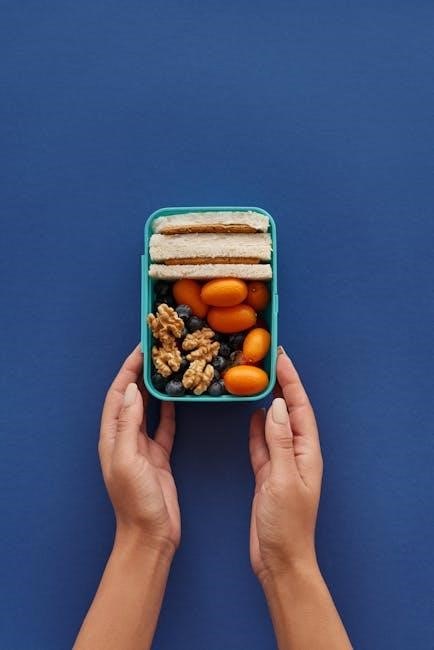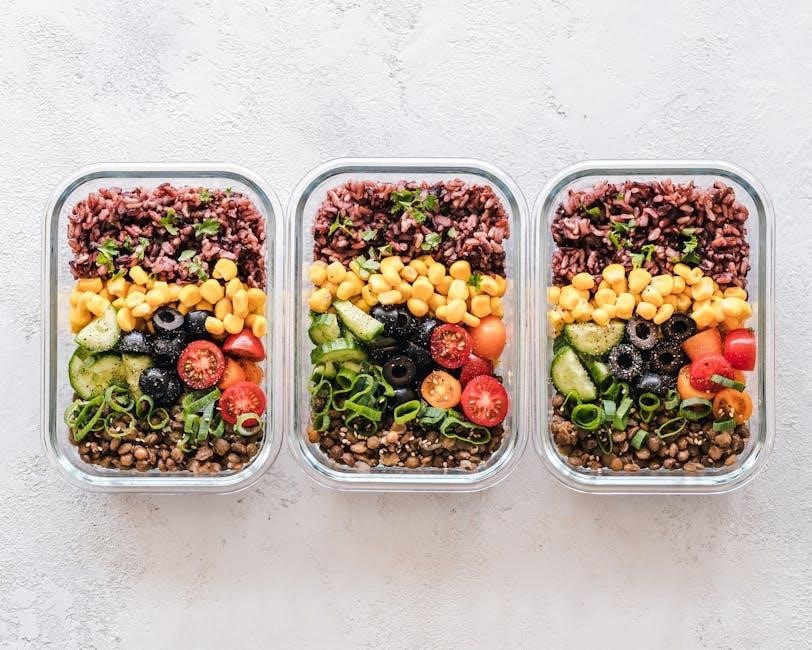marathon meal plan week before pdf
A well-structured marathon meal plan is essential for optimizing performance and recovery. It provides a tailored approach to fueling your body in the week leading up to race day.
1.1 Importance of Nutrition in Marathon Preparation
Nutrition plays a critical role in marathon preparation‚ directly impacting energy levels‚ recovery‚ and overall performance. A balanced diet ensures proper fueling for intense training‚ aids in muscle repair‚ and reduces the risk of injury or fatigue. Properly timed meals‚ especially in the final week‚ help maximize glycogen stores‚ which are vital for endurance. Adequate carbohydrate intake‚ paired with lean proteins and hydration‚ supports sustained energy and optimal physical function‚ making nutrition a cornerstone of successful marathon preparation.
1.2 Overview of the Week-Long Meal Plan
A well-structured week-long meal plan is designed to optimize energy stores‚ enhance recovery‚ and ensure peak performance on race day. The plan focuses on balancing carbohydrates‚ proteins‚ and fats‚ with an emphasis on hydration and electrolyte balance. Meals are tailored to gradually increase carbohydrate intake‚ peaking in the final days before the marathon to maximize glycogen stores. The plan avoids new or unfamiliar foods to reduce the risk of digestive issues. Each day builds on the previous‚ ensuring the body is fully prepared for the demands of the race‚ while allowing for customization based on individual needs and preferences.

Key Principles of the Marathon Meal Plan
Emphasizing balanced nutrition‚ proper timing‚ and familiar foods ensures optimal energy levels. The plan prioritizes hydration‚ electrolyte balance‚ and avoiding digestive disruptions to support peak performance and recovery.
2.1 Carbohydrate Loading Strategies
Carbohydrate loading is crucial for maximizing glycogen stores before a marathon. Focus on consuming complex carbs like pasta‚ rice‚ and whole grains. Increase intake gradually‚ starting five days out‚ ensuring balanced meals with protein and healthy fats. Avoid overeating to prevent digestive discomfort. Pair carbs with hydration to enhance absorption. Stick to familiar foods to minimize stomach issues. Aim for 8-12 grams of carbs per kilogram of body weight daily during the loading phase. Timing meals correctly ensures energy availability on race day‚ supporting endurance and performance.
2.2 Hydration and Electrolyte Balance
Proper hydration and electrolyte balance are vital for maintaining performance and preventing dehydration. Aim to drink 8-10 glasses of water daily‚ adjusting for sweat loss. Include electrolyte-rich drinks like coconut water or sports beverages to replenish sodium and potassium. Avoid caffeine and alcohol‚ as they can dehydrate you. Monitor urine color—pale yellow indicates optimal hydration. Balance electrolytes by incorporating foods high in sodium and potassium‚ such as bananas and nuts. Adjust intake based on sweat levels to prevent imbalances. Prioritize hydration during meals to enhance nutrient absorption and support overall bodily functions.
2.3 Avoiding New or Unfamiliar Foods
Avoiding new or unfamiliar foods is crucial during marathon preparation to prevent digestive discomfort. Stick to familiar meals and ingredients‚ especially in the week leading up to the race. New foods can cause stomach upset‚ cramps‚ or diarrhea‚ which may hinder performance. Opt for tried-and-tested recipes and avoid experimenting with exotic or spicy dishes. This strategy minimizes the risk of gastrointestinal issues and ensures your body remains in optimal condition. Plan meals in advance using well-known‚ easily digestible foods to maintain comfort and confidence throughout your training and on race day.

Day-by-Day Meal Breakdown
This section provides a detailed‚ week-long meal schedule tailored to marathon preparation. Each day focuses on specific nutritional goals‚ ensuring optimal energy stores and hydration levels.
3.1 Seven Days Before the Marathon: Building Energy Stores
Seven days before the marathon‚ focus on gradually increasing carbohydrate intake to maximize glycogen stores. Incorporate complex carbs like whole grains‚ pasta‚ and vegetables into meals. Pair these with lean proteins and healthy fats for balanced nutrition. Stay hydrated by drinking plenty of water and electrolyte-rich beverages. Avoid new or unfamiliar foods to prevent digestive issues. Aim for consistent meal portions and timing to maintain energy levels. This phase lays the foundation for optimal performance‚ ensuring your body is adequately fueled for the demands ahead.
3.2 Five Days Before: Increasing Carbohydrate Intake
Five days before the marathon‚ shift your focus to increasing carbohydrate intake to boost glycogen stores. Prioritize whole grains‚ pasta‚ rice‚ and starchy vegetables at meals. Include lean proteins like chicken‚ fish‚ or eggs‚ and healthy fats such as avocados or nuts for balance. Avoid heavy fiber intake to prevent digestive discomfort. Stay hydrated with water and electrolyte-rich drinks to support absorption. Aim for consistent meal timing and portion sizes to maintain steady energy levels. This phase ensures your body is well-fueled for the upcoming demands of race day.
3.3 Three Days Before: Fine-Tuning Nutrition
Three days before the marathon‚ focus on fine-tuning your nutrition to optimize performance. Reduce high-fiber foods to minimize digestive discomfort‚ while continuing to prioritize high-carbohydrate meals. Incorporate lean proteins like chicken‚ turkey‚ or fish‚ and include healthy fats such as avocado or nuts for sustained energy. Hydrate thoroughly with water and electrolyte-rich beverages to maintain fluid balance. Avoid introducing new or unfamiliar foods to prevent stomach issues. Keep meals simple‚ balanced‚ and familiar to ensure your body is in prime condition for the final stretch of preparation.
3.4 Two Days Before: Final Carbohydrate Load
Two days before the marathon‚ focus on maximizing carbohydrate intake to store glycogen. Prioritize high-carb foods like pasta‚ rice‚ bread‚ and potatoes. Aim for 8-12 grams of carbs per kilogram of body weight daily. Reduce fat and protein portions to optimize carb absorption. Include electrolyte-rich foods or drinks to maintain balance. Avoid heavy‚ greasy‚ or high-fiber meals to prevent digestive issues. Stay hydrated with water and electrolyte beverages. This phase ensures you reach race day with maximum energy stores‚ reducing the risk of hitting the wall during the marathon.
3.5 One Day Before: Rest and Light Meals
On the day before the marathon‚ prioritize rest and light‚ easily digestible meals to allow your body to recover and prepare. Opt for low-fiber‚ low-fat‚ and low-protein foods like toast‚ bananas‚ oatmeal‚ or plain rice. Avoid heavy‚ spicy‚ or unfamiliar dishes to prevent digestive discomfort. Stay hydrated with water and electrolyte drinks to maintain fluid balance. Keep meals small and spaced out to ensure easy digestion. Avoid caffeine and alcohol‚ which can disrupt hydration and sleep. Aim for 8-10 hours of sleep to ensure you feel refreshed and ready for race day.

Race Day Nutrition
On race day‚ fuel with a light‚ high-carb breakfast 2-3 hours before the start. Opt for familiar foods like oatmeal‚ toast‚ or a banana. Stay hydrated with water or electrolyte drinks. During the race‚ consume energy gels or fruits as needed to maintain energy levels. After finishing‚ recover with a balanced meal rich in protein and complex carbs within 30 minutes to aid muscle repair and replenish glycogen stores.
4.1 Ideal Breakfast for Race Morning
The ideal breakfast on race morning should be consumed 2-3 hours before the start to allow proper digestion. Opt for high-carbohydrate‚ low-fiber foods like oatmeal‚ whole-grain toast‚ or a banana. Avoid heavy‚ fatty‚ or high-protein foods that may cause stomach discomfort. Hydrate with water or a sports drink to maintain electrolyte balance. Stick to familiar foods to minimize the risk of digestive issues. A sample breakfast could include a bowl of oatmeal with honey‚ a slice of toast‚ and a small amount of fruit. Avoid trying anything new to ensure your body is comfortable and ready for the race ahead.
4.2 Mid-Run Fueling and Hydration
Proper mid-run fueling and hydration are critical for maintaining energy levels and preventing dehydration. Aim to consume 30-60 grams of carbohydrates per hour‚ starting after the first 30-45 minutes of running. Energy gels‚ bananas‚ or sports drinks are excellent options. Hydrate with water or electrolyte-rich beverages to replenish lost salts and maintain fluid balance. Avoid trying new foods or drinks during the race to minimize stomach discomfort. Practice your fueling strategy during training to ensure it works for you on race day. Consistency and timing are key to optimizing performance and avoiding energy depletion.
4.3 Post-Race Recovery Meals
After completing the marathon‚ prioritize recovery meals rich in carbohydrates and protein to repair muscles and replenish energy stores. Aim to eat within 30-60 minutes post-race‚ when your body is most receptive to nutrient absorption. Include lean meats‚ fish‚ or plant-based proteins‚ paired with complex carbs like whole grains‚ fruits‚ and vegetables. Incorporate anti-inflammatory foods such as berries and nuts to aid muscle recovery. Stay hydrated with water or electrolyte-rich drinks to rebalance fluids. A balanced recovery meal helps restore energy‚ supports muscle repair‚ and accelerates the return to training. Timing and nutrition quality are key for optimal post-marathon recovery.

Common Mistakes to Avoid
Overeating or undereating‚ ignoring hydration needs‚ and consuming caffeine or alcohol can disrupt performance. These mistakes often lead to cramps‚ fatigue‚ or stomach discomfort during the race.
5.1 Overeating or Undereating
Overeating or undereating can severely impact marathon performance. Consuming too much food close to race day may cause digestive discomfort‚ while undereating can lead to low energy levels. Runners should balance their meals to avoid these issues‚ focusing on moderate portions of carbohydrates‚ proteins‚ and fats; Proper portion control ensures optimal energy stores without causing stomach distress. Listening to your body and sticking to a structured meal plan helps maintain the right balance‚ preventing performance hindrances during the race. Avoid sudden changes in diet to keep your body in peak condition for the marathon.
5.2 Ignoring Hydration Needs
Ignoring hydration needs is a critical mistake that can hinder marathon performance. Proper hydration ensures optimal bodily functions‚ energy levels‚ and endurance. Dehydration can lead to fatigue‚ dizziness‚ and muscle cramps‚ negatively impacting race results. Runners should drink water regularly throughout the day‚ aiming for at least 8-10 glasses. Additionally‚ monitoring urine color can help assess hydration levels—pale yellow indicates proper hydration. Neglecting hydration can also disrupt electrolyte balance‚ further complicating physical performance. Staying hydrated is as essential as nutrition‚ ensuring the body functions efficiently during intense exertion. Consistent water intake must be prioritized in the final week before the marathon.
5.3 Consuming Caffeine or Alcohol
Consuming caffeine or alcohol in the week before a marathon can hinder performance and recovery. Caffeine‚ while helpful in small amounts for alertness‚ can lead to dehydration and disrupt sleep patterns‚ which are crucial for optimal preparation. Alcohol‚ on the other hand‚ dehydrates the body‚ impairs recovery‚ and reduces endurance. Both substances can interfere with hydration and nutrient absorption‚ negatively impacting energy levels and overall race readiness. It’s best to avoid these substances entirely in the final week to ensure peak physical condition and mental clarity for the marathon.

Sample PDF Meal Plan Structure
A sample PDF meal plan provides a clear‚ organized template for daily nutrition. It includes meal schedules‚ portion sizes‚ and nutritional insights to guide marathon preparation effectively.
6.1 Daily Meal Schedule
A sample PDF meal plan outlines a structured daily schedule‚ ensuring balanced nutrition throughout the week before the marathon. Each day is divided into breakfast‚ lunch‚ dinner‚ and snacks‚ with specific food recommendations. Breakfast options might include oatmeal with fruit or whole-grain toast with eggs. Lunch could feature lean proteins like chicken or fish‚ paired with complex carbs such as quinoa or whole grains. Dinners focus on carbohydrate-rich meals like pasta or rice‚ accompanied by steamed vegetables. Snacks include energy-boosting options like bananas‚ nuts‚ or yogurt. The schedule emphasizes hydration‚ suggesting water intake throughout the day and electrolyte-rich drinks during workouts. Timing of meals is tailored to align with training sessions‚ ensuring optimal fueling and recovery. This structured approach helps athletes avoid digestive issues and maintain energy levels‚ while also providing flexibility for personal preferences.

6.2 Nutritional Information and Tips
The meal plan provides detailed nutritional information‚ ensuring meals are rich in carbohydrates‚ proteins‚ and healthy fats. It emphasizes hydration with water and electrolyte-rich drinks. Tips include avoiding heavy meals the night before the race and opting for light‚ easily digestible foods. Portion control is highlighted to prevent overeating‚ with adjustments based on individual calorie needs. The plan also advises on timing meals around training sessions to maximize energy levels and recovery. Additional tips cover food safety and preparation to avoid stomach discomfort during the race.












Leave a Comment